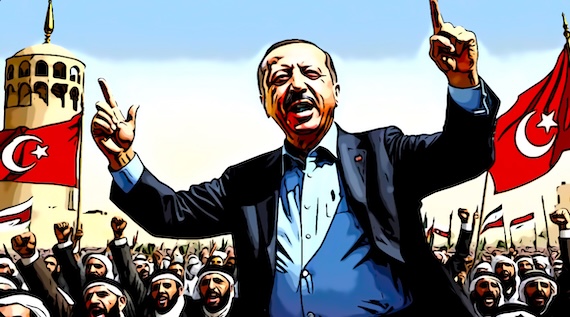( RFE / RL ) – The fall of Bashar al-Assad’s government at the hands of rebels, including Ankara-backed factions, has effectively made Turkey the dominant foreign actor in Syria at the expense of Iran and its ally Russia.
Turkey and Iran have competed for years for influence in the South Caucasus, and this rivalry appears to have now extended to the Levant.
“The Islamic republic has had significant misgivings about Turkish influence in Syria, be it economic, political, or military, long before the fall of Assad. But with the loss of Iran’s sole state ally in the region, these concerns are set to be magnified exponentially,” said Behnam Taleblu, an Iran analyst at the Washington-based Foundation for Defense of Democracies (FDD).
Still, experts say Turkey’s rising profile in Syria to the detriment of Iran does not necessarily mean Ankara-Tehran relations will be significantly impacted.
What Is Turkey After?
Since the onset of the Syrian civil war in 2011, Iran and Russia backed Assad while Turkey supported rebel groups opposed to his rule.
Iran needed Assad to remain in power so that it could use Syria as a staging ground to fund and arm its proxies and partners, especially the Lebanese group Hezbollah.
For Russia, Assad’s rule meant Moscow could maintain its Hmeimim air base and naval base in Tartus, which gave it easier access to the Middle East, North Africa, and the Mediterranean Sea.
Ankara wanted a government in Syria more aligned with its regional vision and policies, especially those that would restrain Kurdish groups in northeastern Syria. A coalition of Kurdish parties, including the Democratic Union Party (PYD), heads the Autonomous Administration of North and East Syria.
PYD’s armed wing, the People’s Protection Units (YPG), leads the U.S-backed Syrian Democratic Forces (SDF).
“Turkey has had three core concerns in Syria: fighting the YPG/PYD, enabling the return of Syrian refugees to Syria, and preventing further refugee flows into Turkey,” said Daria Isachenko, a Turkey expert at the German Institute for International and Security Affairs.
Assad’s downfall on December 8 has stemmed the influx of refugees into Turkey, but the “first two concerns remain,” Isachenko added.
Syria is now effectively ruled by the U.S.-designated terrorist organization Hayat Tahrir al-Sham (HTS) and its allies — some of whom are linked with Turkey, Iran’s rival.
Isachenko says Turkey’s growing influence in Syria could further strengthen its position in the Mediterranean Sea if Ankara signs a Libya-style maritime deal with the new authorities in Damascus.
The Road Ahead
Turkey’s growth in stature and Iran’s weakened position in Syria could have ramifications for developments in the South Caucasus, where Iran, Russia, and Turkey vie for influence.
Experts say while the Astana talks — a format sponsored by the three countries to end the conflict in Syria — may be dead, it still served as a platform for managing different interests.
“Coordination and consultation on conflict management between Turkey and Iran as well as Russia on the Middle East and the South Caucasus should not be ruled out,” Isachenko said.
She adds that even in Syria, Turkey and Iran may find some of their interests aligned, such as finding a common adversary in Israel, which has moved into Syrian territory since the fall of Assad.
“Turkish Victory in Syria,” Digital, Dream / Dreamland v3 / Clip2Comic, 2024
Still, some argue that Tehran will seek to undermine Turkey in Syria in the hopes of returning the country into its so-called axis of resistance — Iran’s loose network of regional allies and proxies.
“The Islamic Revolutionary Guards Corps will look for ways to claw back influence in Syria,” said Taleblu of FDD.
“Downtrodden, disposed, and spurned local actors are easy to co-opt, particularly in states where central authority is weak.”
The Kurdish Question
U.S. support for the Kurdish-led SDF has weakened in recent years due to a combination of factors, including the withdrawal of a majority of U.S. troops in 2018 and 2019 and pressure from Washington’s NATO ally, Turkey.
Ankara, which launched an incursion into northern Syria in 2019 against Kurdish forces, is now in a strong position to further challenge the Kurds, experts say.
Since Assad’s fall, Ankara-backed rebel groups have clashed with Kurdish forces and seized the previously Kurdish-controlled cities of Manbij and Tarafat near the border with Turkey.
Wladimir van Wilgenburg, an Iraqi Kurdistan-based analyst who has co-authored books on Syrian Kurds, says the presence of the 900 remaining U.S. troops might offer some protection to the Kurds but the situation remains precarious.
“The new administration in Damascus likely will prefer relations with Turkey over the SDF,” he said. “The situation is difficult for the Kurds unless they reach an agreement with HTS.”
HTS leader Ahmad al-Sharaa, previously known by the nom de guerre Abu Muhammad al-Jolani, wants to unify all armed groups in Syria under one banner. But if the SDF were to join, it would effectively end Kurdish autonomy in Syria, Wilgenburg says.
Via RFE / RL
Copyright (c)2024 RFE/RL, Inc. Used with the permission of Radio Free Europe/Radio Liberty



 © 2025 All Rights Reserved
© 2025 All Rights Reserved